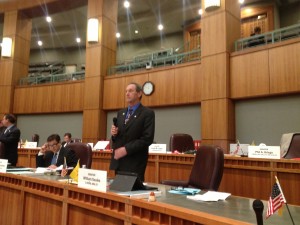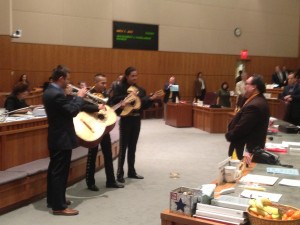For immediate release
Contact: Arnold Vigil, (505) 986-4263
SENATE REVIEW: March 7, 2013
Straight-Party Line Vote Decides Straight-Party Voting Bill
The Senate voted to restore straight-party voting to New Mexico elections by a 24-17 vote on Thursday.
Speaking in favor of Senate Bill 276, Senator Howie Morales (Catron, Grant, Socorro, District. 28) informed the body that from 1960 to 2010, voters in New Mexico had the option of voting for all Democrat or all Republican candidates on a ballot.
“We want people to be able to vote how they wish, having more options on the ballot provides consistency to voters,” Senator Morales said. “When this option was taken away, there was no input from the public and a very low level of information given to them regarding the change.”
Secretary of State Dianna Duran removed the straight-party voting options from the ballots after being elected in 2010, saying that she was not obligated because it is not in statute. Her move is currently being challenged in federal court.
“I had a lot of people in my district, elderly people, who were very distraught on Election Day,” said the bill’s sponsor Senate Majority Leader Michael S. Sanchez (Valencia, Bernalillo, District 29) “They are used to the straight-party voting option. Some didn’t get to finish their ballots.”
“Democrats are committed to fairness in elections and allowing as many people access to the ballot as possible,” added Senator Jerry Ortiz y Pino (Bernalillo, District 12). “Democrats are sponsoring legislation that will engage our youth at earlier ages, provide consistency and support at polling locations, and extend the voter registration process throughout the early voting period.”
Senate Passes Unanimously Bill that Will Waive Utility Reconnect Fees
Charged to Military Personnel Returning from Military Duty
Senate Bill 574, sponsored by Senator Bill Soules (Las Cruces, District 37), will allow the duty-free suspension of essential home utility services such as gas, electricity and telecommunications for members of the military deployed for longer than 30 days in service of the United States.

“It’s a very good bill that supports our military,” Senator Soules said during the debate of the legislation, which was the freshman lawmaker’s first passed bill. “Some people are out for up to six months to a year and they won’t leave the utilities on.”
Utility companies regulated by the Public Regulation Commission would be required to reconnect services upon the individual’s arrival without charging a reconnection fee as long as they can prove their absence was an official duty required by the military. A committee substitute for the original bill removed a requirement to reconnect cable without a fee because cable is seen as an optional and not necessary utility. An analysis of the bill says the waived reconnect fees would more than likely be absorbed by the utility’s other rate payers.
The bill now heads to the House of Representatives for review.
Bill that Addresses PERA Solvency Issues Passes Senate
The Senate passed an amended version of Senate Bill 27, “Public Employee Retirement Changes,” sponsored by Senator George K. Munoz (Cibola, McKinley, San Juan, District 4).
SB 27 would affect all current and retired members of the Public Employees Retirement Association by reducing the annual cost of living adjustments from 3 percent to 2 percent, beginning in 2014. Workers earning less than $20,000 would have their COLAs reduced to 2.5 percent. PERA officials have said that the COLA reduction is the most effective way to shore up the diverse retirement plan, which they say will eventually become insolvent at the current funding levels.
In addition, a phased-in schedule of increased contributions by both government employees and government employers would increase. Current workers who retire before June 30, 2014, would have to wait two full calendar years for the 2 percent increase, three years before June 30, 2015, four years before June 30, 2016, and seven years thereafter.
During a review of SB 27 in the Senate Finance Committee, an amendment was added that reduced future state contributions to the fund from being raised 1.5 percent down to 0.4 percent. A spokesman for the governor’s office told the media that Governor Susana Martinez felt that the original government increase was too generous and wanted it reduced to the lower amount, otherwise she would veto the bill.
During debate of SB27 on Thursday, Senate Majority Floor Leader Michael S. Sanchez (Valencia, Bernalillo, District 29) introduced a floor amendment that would have restored the state contribution to its original 1.5 percent increase, a figure in the original bill that would have brought the solvency levels up to 100 over 30 years and was determined by interim committee comprised of many different groups. The amendment failed on a 24-18 vote.
Senator Munoz said the 0.4 percent increase will bring the solvency level up to 90 percent over 30 years. “It’s not something that everyone wants to do, but it’s something that we have to do,” Senator Munoz said.
Among other highlights of the SB 27: The annual service credit toward retirement remains at 3 percent per year for all general-plan employees hired before July 2010, and they can still retire at any age when reaching at least 75 percent accumulated service credits. The rate is reduced to 2.5 percent annually for those hired after July 2010 and they also must work until at least age 55 even though they might have already reached the 75 percent service-credit threshold years before. Any combination of earned service credit and an employee’s age adding up to 80 will make an employee eligible to retire for those hired after 2010
On the other hand, the bill allows for an employee to accrue retirement service credits of up to 90 percent of his/her final retirement-salary determination by working longer. Currently the final retirement is capped at 80 percent, no matter how many extra years are worked. Employees hired after 2010 will also have their final monthly retirement salary based upon their highest five years of salary, up from the current three highest paid years. Law enforcement, corrections and fire protection personnel, who currently have a 20-year option, will also be affected by the bill. The bill now heads to the House of Representatives for review.
Bill Makes Nationally Certified School Counselors Eligible for Onetime Raise
Licensed public school employees who are certified by the National Board of Professional Teaching Standards (NBPTS) would qualify for a onetime salary increase during the 2014-15 school year that was previously only available to teachers, according to a bill passed by the Senate on Thursday with a bipartisan vote of 39-1.
Senate 359, School Employee Program Units, sponsored by Senator John Sapien (Bernalillo, Sandoval, District 9), would amend the Public School Finance Act to include school counselors and other NBPTS-certified staff who aren’t eligible to receive the one-time salary differential. The increase is based on a formula of “1.5 times the unit value set for the school year.” For example, the unit value set for the 2011-12 school year was $3,598.97 and the NBPTS boost was $5,398.46.
Senator Sapien commented that studies have shown that NBPTS-certified employees have been some of the most effective public school employees who have made big differences in the lives of their students.
Committee Bill Passes That Makes Improper Use of Airborne Spy Devices Illegal
The Senate Public Affairs Committee on Thursday night voted a do-pass on Senate bill 556, introduced by Senator Jerry Ortiz y Pino (Bernalillo, District 12), which would make it illegal for citizens and state agencies to use the so-called airborne “spy” technology over anyone else’s property, business or farm without the owner’s permission.
The bill would establish the “Freedom from Unwarranted Surveillance Act,” which would protect the privacy of citizens on their own property from unknowingly being watched by such devices. The bill identifies such remote-controlled devices as unmanned, aerodynamic, expendable or recoverable, capable of carrying a payload.
The bill exempts agencies conducting surveillance under the authority of a court-issued warrant or a law enforcement agency that can prove reasonable suspicion that an immediate action with the device was needed to prevent danger to someone’s life. But evidence collected in violation of this act would not be admissible in court.
Anyone charged with unlawfully using such a flying device would be subject to a petty misdemeanor and allows a victim of this crime to pursue legal action.
“The ability to spy on someone with gadgets like these only used to be imagined in science fiction tales or in James Bond movies,“ said Senator Ortiz y Pino. “But, today, they are actually quite real and we need to make sure they are used properly and do not violate anyone’s rights to reasonable privacy.
“To be a ‘fly on the wall’ is now quite possible.”
In other Senate Action:
* The tax rate charged per liter of wine sold by statewide wine growers would be modified to help small wine producers, according to a bill passed by the Senate on Thursday. Senate Bill 166, sponsored by Senator John Arthur Smith (Dona Ana, Hidalgo, Luna, Sierra, District 35), would lower the tax to 30 cents per liter sold between 950,000 and 1.5 million liters, down from 45 cents previously charged at liters sold over the 950,000.mark. The higher rate would still apply to all liters sold over the 1.5 million mark. The bill goes over to the House for tasting.
* Marciachi players sing “Las Mananitas” to Senator Richard Martinez (Los Alamos, Rio Arriba, Sandoval, Santa Fe, District 5) on 60th birthday on Thursday. “El Jefe” was then subject to the traditional Senate “Happy Birthday” rendition by Senator Stuart Ingle (R, Chaves, Curry, De Baca, Lea, Roosevelt, District 27).



Comments are closed.